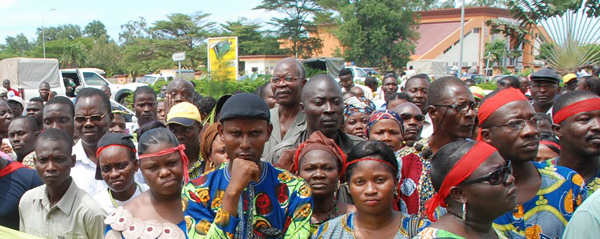- Washington “follows with interest” Morocco’s openness onto Africa (John Kerry)Posted 12 years ago
- The trial of South African Paralympic champion Oscar Pistorius opened in Pretoria on Monday.Posted 12 years ago
- USA welcomes efforts of King Mohammed VI in MaliPosted 12 years ago
- Egypt’s population reaches 94 millionPosted 12 years ago
- Mugabe celebrates his 90thPosted 12 years ago
- Moroccan Monarch to Build a Perinatal Clinic in BamakoPosted 12 years ago
- King Mohammed VI handed a donation of bovine semen for the benefit of Malian breeders.Posted 12 years ago
- Moroccan King’s strategic tour to Africa: Strengthening the will of pan African Solidarity and stimulating the south-south cooperation mechanisms over the continentPosted 13 years ago
- Senior al-Qaida leader killed in AlgeriaPosted 13 years ago
- Libya: The trial of former Prime Minister al-Baghdadi AliPosted 13 years ago
Africa: Land invasion and expropriation
 Africa, the poorest continent, is subject to appropriation of its land at a large scale. The phenomenon, far from being charitable, is taking vast agricultural areas in favour of large and intensive bio fuels or crops production exclusively dedicated to export to and by some wealth states, to ensure food security of their citizens. In most contracts and cooperation agreements signed recently between African countries and developed or industrialised economies, a paragraph is reserved for agriculture.
Africa, the poorest continent, is subject to appropriation of its land at a large scale. The phenomenon, far from being charitable, is taking vast agricultural areas in favour of large and intensive bio fuels or crops production exclusively dedicated to export to and by some wealth states, to ensure food security of their citizens. In most contracts and cooperation agreements signed recently between African countries and developed or industrialised economies, a paragraph is reserved for agriculture.
China, Turkey, Brazil, countries of the European Union or multinationals, are activating for large-scale conquest of land across the continent. Several African countries suffer the assaults of the race to land being waged by Asians and Europeans. Thus, according to experts of the Technical Centre for Agricultural and Rural Development (CTA), that has met in Yaoundé in last September with experts from the Economic Community of Central African States (ECCAS), the European Union, the French Development Agency and the food packaging (PROPAC), as part of the acquisition of lands in Central Africa, 120 organisations including multinational food processing and finance like Goldman Sachs, are currently being organised for the purchase of vast tracts of land in over 100 countries. According to the Centre of Studies and Prospective (CEP) of the French Ministry of Food, 20 million hectares of land are affected by the phenomenon. 450 000 hectares are in the hands of foreign investors in Ghana, 803 000 in Madagascar, or 600 000 in Ethiopia. The reason that makes the finance and agribusiness barons run to Africa and appropriate its lands is linked to the current context: “Africa is becoming a pole of attraction through its economic potential. This enthusiasm, according to Andre Tioro, secretary general of the Roppa association in Burkina Faso, has led to the appropriation of 700 000 hectares of land in Mali, and 100 000 hectares in Niger by Libya. This race and non charitable enthusiasm to grab land in Africa are not without arousing resentment. In Madagascar, the Korean company Daewoo had suffered a sharp opposition from people, having received from the State large areas of land. Populations that have not received their interest in this project denounced the lack of transparency and forced the group to leave the territory. The threat of invasion looming over the lands of the continent was predictable, following the pattern traced by the structural adjustment plans imposed by the World Bank, as a Chadian producer stated. “We did not allow countries to invest in productive sectors and thus in agriculture. With this option, states have abandoned vast tracts of land that could be used for agricultural development, to establish sovereignty and food security of the country and participate in the profitability of our land. If the external threat is most visible, there is however another, more violent, within countries and that comes from the elites. “You have villages that have become the property of individuals, who bought thousands of acres of land in the countryside,” said an agronomist. A phenomenon that has created, particularly in Zimbabwe and South Africa, the violent anger of the black people deprived of arable lands, while 90% of arable land was owned by white farmers.
